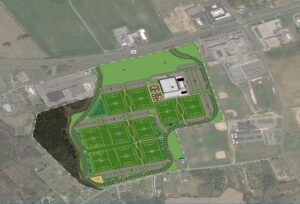
OCEAN CITY – Recommendations to seek state funding and initiate an RFP process highlighted last week’s meeting of the Ocean City Sports Complex Task Force.
Last Thursday, members of the task force reconvened to discuss funding and legislative options for a proposed sports complex in Worcester County. Before going into closed session to discuss property acquisition, the task force agreed to pursue funding options at the state level and to seek proposals from operators to run the facility.
“There’s essentially two costs, the cost to build and the cost to operate,” City Manager Terry McGean said in an interview last week. “We believe based on what we’ve seen, if we get an operator on board early, the operational costs could be done so we break even.”
For years, resort council members have expressed their desires to develop a sports complex somewhere near Ocean City. And in 2019, the town commissioned the Maryland Stadium Authority (MSA) and its consultant, Crossroads, to conduct a market and economic analysis for a proposed sports complex in the Ocean City area. When the pandemic hit, however, MSA officials were tasked with revising the study and producing a site-specific assessment of a 95-acre site next to Stephen Decatur High School.
While the county initially took the lead on the project, the Worcester County Commissioners voted last year to terminate its contract for the purchase of the property and to end any county involvement in the development of a complex. Since that time, resort officials have agreed to take on the project and form a task force to address community concerns relating to the project’s location and scope.
With nearly 30 members at the table earlier this fall, the task force kicked off its first meeting with a presentation from MSA and Crossroads, as well as from Sports Facilities Companies, a national firm specializing in sports facilities management. By the end of the meeting, the task force agreed a proposed complex should include both indoor and outdoor facilities but that more information was needed on the funding mechanism.
Last Thursday, the task force reconvened to discuss the town’s funding options. The group unanimously agreed to seek a 1% room tax increase from the Maryland General Assembly, with a portion of that additional revenue to be dedicated to the development of the sports complex.
“In open session we presented a funding option to pursue 80% funding from the state in partnership with the Maryland Stadium Authority,” McGean said. “And for the 20% local share, we would go to the state to ask for an increase in the room tax, as we’ve done in the past, and dedicate six-tenths of the room tax for our share of the debt service. In that case, the sports complex would not be paid for with property tax, but by room tax.”
McGean said the town would also seek state funding for site assessment and preliminary design work.
“This year, we are going to ask for $500,000 or $1.2 million, depending on which way we get the funding, for site assessment and preliminary design,” he said. “The next legislative session, we would go for the full construction amount.”
To keep the project moving, however, the task force sent a favorable recommendation to the Mayor and Council to essentially forward fund the site assessment and design work.
“The first official task force recommendation to the Mayor and City Council was to recommend that the council pass a resolution to reimburse the town $500,000 toward the project from a future bond issue …,” he said. “This will give us some seed money to keep moving while we wait for the legislature.”
The task force also recommended the town issue a request for proposals (RFP) to sports complex operators. McGean said the sooner an operator is found, the sooner the facility can start making money.
“The other recommendation was that we, the city, initiate an RFP process to bring an operator on board early and make sure the facility is set up,” he explained.
Following its open session, the task force entered into a closed session to discuss property acquisition. Excluding the cost of land, officials estimate the sports complex to cost between $157 million and $170 million, which includes design work, construction, furnishings and equipment.

